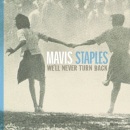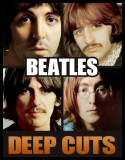Music Home / Entertainment Channel / Bullz-Eye Home
 Buy your copy from Amazon.com
Buy your copy from Amazon.com
| Mavis Staples: We'll Never Turn Back Released: 2007 |
There was a time, not all that long ago, when the breadth of most people's knowledge of the Staple Singers was limited to “I'll Take You There” (and maybe “Respect Yourself” and “Let's Do It Again”), but the passage of decades – not to mention a plethora of inferior covers – have dusted over the contributions the group made to contemporary music. And they did contribute: Aside from bringing gospel to mainstream pop audiences in the '60s, the Staple Singers – consisting of Roebuck “Pops” Staples and his children Cleotha, Pervis, Yvonne, and Mavis – were also one of the first groups to send the civil rights struggle to the radio.
As Mavis notes in this album's booklet, the Staple Singers were mainly a church act when, in 1963, they saw Martin Luther King, Jr. speak. Pops told his children, “I like this man. I like his message. And if he can preach it, we can sing it.” Aside from being a cool story and a wonderfully concise message statement, Pops' words of wisdom should tell you everything you need to know about why modern audiences should care about the dozen protest songs that make up We'll Never Turn Back – it's no history lesson, it's a resounding battle cry from a soul survivor.
It was also produced by Ry Cooder, which is why music dorks are apt to care more about it than, say, the stuff Mavis recorded for Paisley Park in the '80s and '90s; aside from a few bright spots, her solo career has been largely frustrating, and Cooder – whatever oddball tangent he happens to be working as a solo artist – is a terrific fit for her gifts. Aside from turning in some of the tastiest guitar work he's committed to tape in 20 years, Cooder drafted his usual suspects (his son Joachim, drummer Jim Keltner, bassist Mike Elizondo) to provide the rhythm section. Filling in the gaps, at Mavis' request, are none other than the SNCC Freedom Singers and Ladysmith Black Mambazo. (Clearly, there is no shortage of soul on this album.)
To keep things loose, Cooder refused to tell Staples which song they were recording on any given day until they got started, and the approach paid dividends. Though some may sniff at a few of the album's well-worn tracks -- “Eyes on the Prize,” “We Shall Not Be Moved,” “Jesus Is on the Main Line,” etc. -- Mavis is never less than completely inside the song, and she makes each of them her own.
Even the most skeptical listeners will be hard-pressed to dismiss the album's back half. It's here that Staples and the band really start to loosen up, running through an incendiary take on “99 ½” and two sterling new originals, “My Own Eyes” and “I'll Be Rested.” This is political stuff, and if you don't have any interest in the modern history of race relations in America, some of the references will sail over your head; what surely will not escape you, however, is the depth of feeling that moves the music. Mavis Staples' voice is not what it once was, but that only serves to work in We'll Never Turn Back's favor, because songs like these demand a voice that carries the weight of experience. They aren't supposed to be pretty, they're supposed to mean something. Delivered now, in an era in which the struggles its songs speak to are largely, and incorrectly, regarded as a thing of the past, this album resonates all the more strongly. Whether regarded as a trenchant sociopolitical statement or simply a marvelous example of modern soul music, We'll Never Turn Back is destined to go down as one of the finest releases of the year.
jeffg@bullz-eye.com






